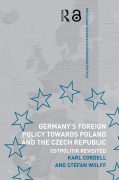Co-authored with Karl Cordell, this book represents a new exploration of how the events of the twentieth century still cast a shadow over relations between Germany, Poland and the Czech Republic.
Using social constructivism as its main theoretical perspective, this book provides a comparative assessment of Germany’s post-reunification relations with the Czech Republic and Poland within the framework of the contemporary alliance structure. Identifying the key actors and factors, we examine the long-standing continuity in the norms and values that underpin German foreign policy and explore the issues of borders, territory, identities, minorities, and population transfers. Paying particular attention to the process of European integration and the role of the new Germany within Europe, we identify how new possibilities for co-operation might finally overcome legacies of the past.
Cordell and Wolff have published a useful study, which contributes to understanding the special relationship between Germany and its Eastern neighbours. — Political Studies Review
Karl Cordell and Stefan Wolff present a much-needed addition to the literature on the motivations of German foreign policy makers…they seek to present an important piece of the ‘German question’ puzzle, and the result is a must-read book for anyone exploring ethnic relations. — Journal of Contemporary European Studies

